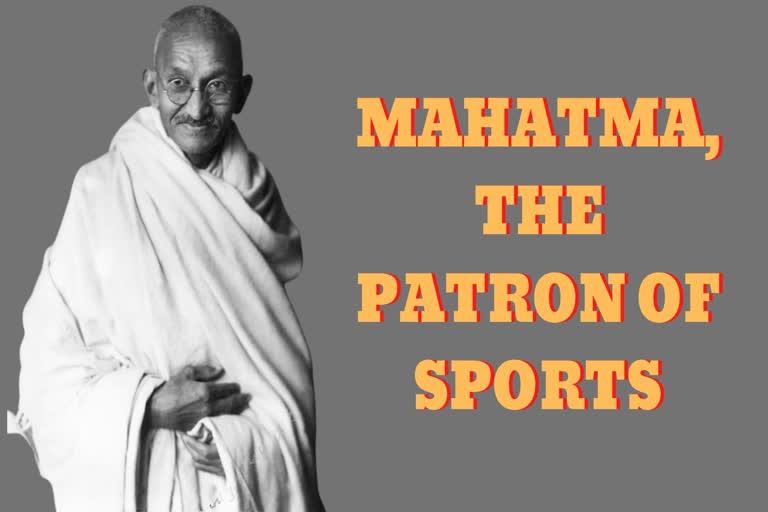Hyderabad: Looking at his identical image as a bespectacled frail man wearing a white dhoti and walking with a stick in hand, it is difficult to accept the fact that Mahatma Gandhi was a passionate advocate of sports. There is no evidence of Gandhi taking the field to play sports but noted historian Ramchandra Guha's 2008 write-up (Gandhi: did he spin more than khadi?) for Wisden Almanack based on the 1948 interview of Gandhi's only surviving sister, given to American journalist Louis Fischer, who wrote the most comprehensive biography of the great Indian man, revealed that the Father of the Nation was indeed a sports aficionado.
In that interview, she recounted that her brother was so engrossed in sports, such as cricket, football and tennis, that he even forgot to have his meals. Fascinatingly, both Gandhi and Jam Sahib of Nawanagar, great cricketer Sir Ranjitsinhji Vibhaji Jadeja, after whom the Ranji Trophy was named, studied at the same college in Rajkot. Both of them later went to England to complete their studies. An alumnus of Cambridge University, Ranji eventually became a cricketer par excellence. He went on to play 15 Tests for England and scored 989 runs at a brilliant average of 44.95. On the other hand, Gandhi, deprived of opulence, faced many obstacles before he could complete his degree in law from London University.
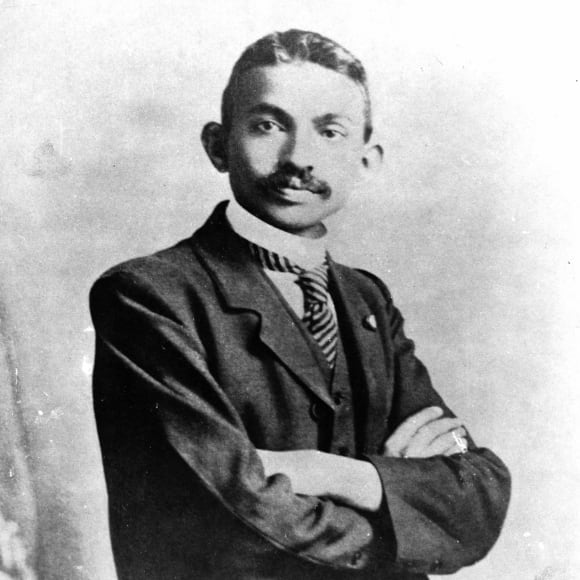
Gandhi would often walk on foot to attend classes to save money. There was no written or pictorial evidence to prove that he played any sport during his student life in London. But a 1958 interview of his classmate claimed that he was a "dashing cricketer".
Upon finishing his law degree in London, Gandhi returned to India in 1891. Though he became Barrister Mohandas Karamchand Gandhi, in the British ruled colonial India his legal career never took off. After two years of struggle, in April 1893, Gandhi took the path-breaking decision of his life that would later change the fortune of India. He moved to South Africa to pursue a career as a lawyer. He was given a job by a law firm called Dada Abdulla & Co.
In South Africa, another British ruled country, racism was rampant. Gandhi was thrown off the train while travelling to Pretoria from Durban at Pietermaritzburg station as he refused to shift to third class from the first class, which was only reserved for the Whites. It was Gandhi's first encounter with racism in Africa. This incident played a significant role in his decision to take up social activism to fight for the equal rights of Indian people residing in South Africa doing poor jobs.
Football for unity
In 1896, Gandhi, a relatively unknown lawyer then in South Africa, was captivated by football's power to attract large crowds. Taking note of local people's passion for the game, he thought of using the sport as a tool for social change. Encouraged by football's potential to draw people's attention, he formed the Transvaal Indian Football Association. Peter Alegi, a professor of African history at Michigan State University, says it “most likely the first organized football group on the continent that was not run by the Whites". Though Gandhi never played football, he had often distributed pamphlets and given speeches during the half-time break, and talked to the players to empower them to fight for their own rights.
However, there were more logics behind Gandhi's decision to opt for football as a part of his non-violent method of protesting against social oppressions. He used football to achieve equal rights for Indian origin people of South Africa as well as for marginalized non-white natives who had been suffering from the Apartheid.
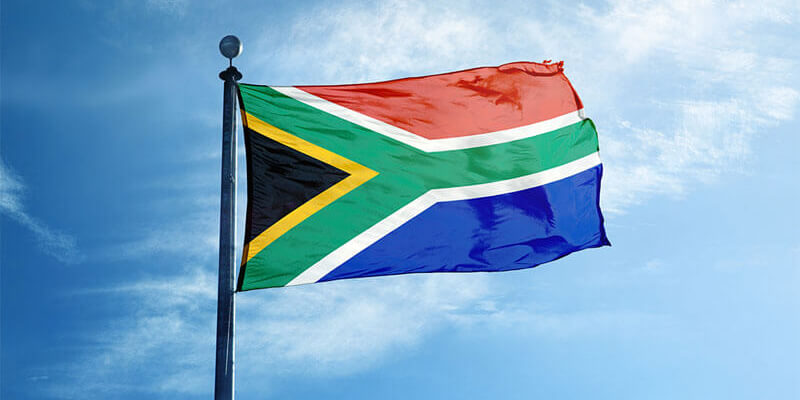
In the build-up to the 2010 FIFA World Cup in South Africa, which happened to be the first such international football tournament in the African continent, Poobalan Govindasamy, President of the South African Indoor Football Association, said, “What fascinated Gandhi, in particular, was the notion he had of football’s nobility."
“At that time, the idea of team play was much stronger than the idea of individual ‘star’ players, and this is something that greatly appealed to him. He believed the game had an enormous potential to promote teamwork. Certainly, he appreciated the game’s usefulness in attracting large crowds, but it would be a mistake to think that football was only a communications platform for Gandhi. It was, I believe, much more. It was one of his great personal passions and one of the ways in which he was able to find spiritual peace,” he further said.
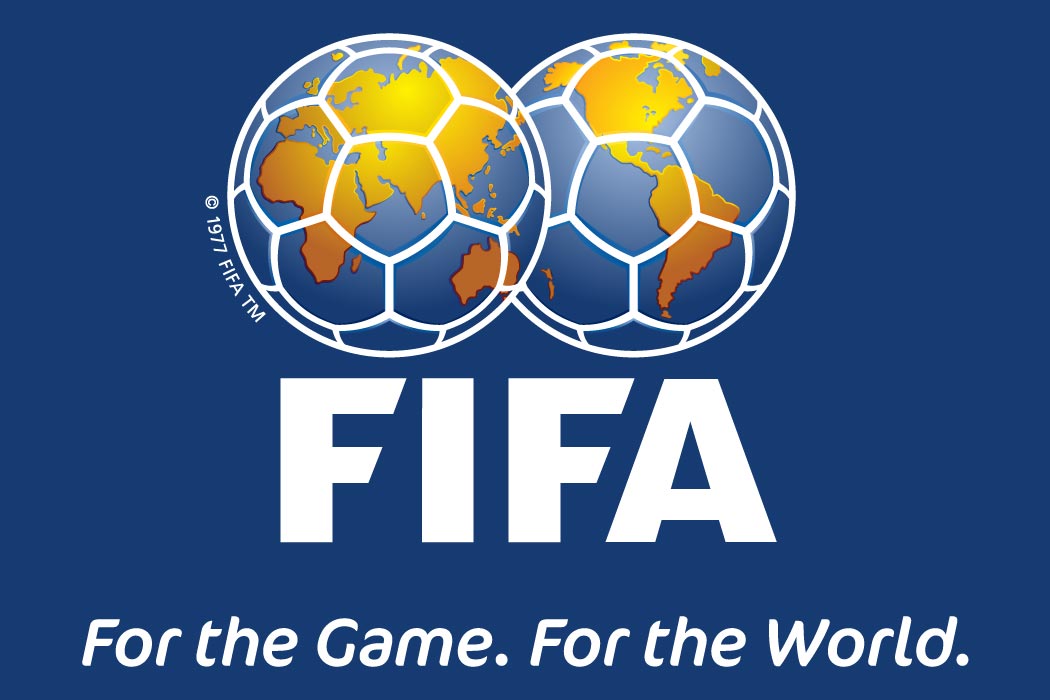
Govindasamy even regarded Gandhi as the pioneer of South African football. He said that it was Gandhi who planted the idea of multi-cultural structure in sports in the Rainbow Nation. “His organisational skills and drive helped to lay the foundations for the non-racial sporting structures of today’s South Africa, because it was Gandhi and his contemporaries who did more than anyone else at the time to involve non-whites, and particularly the country’s Indian population, in structured sporting activities," he stated.
Gandhi achieved his goal in a systematic way. After forming the Transvaal Indian Football Association, he played a vital role in establishing the Klip River District Indian Football Association and the South African Association of Hindu Football in 1903.
Though association football was still far from the reality under the British rule, Gandhi's tryst with the game had paved way the rise of football as a triumphing sport in South Africa.
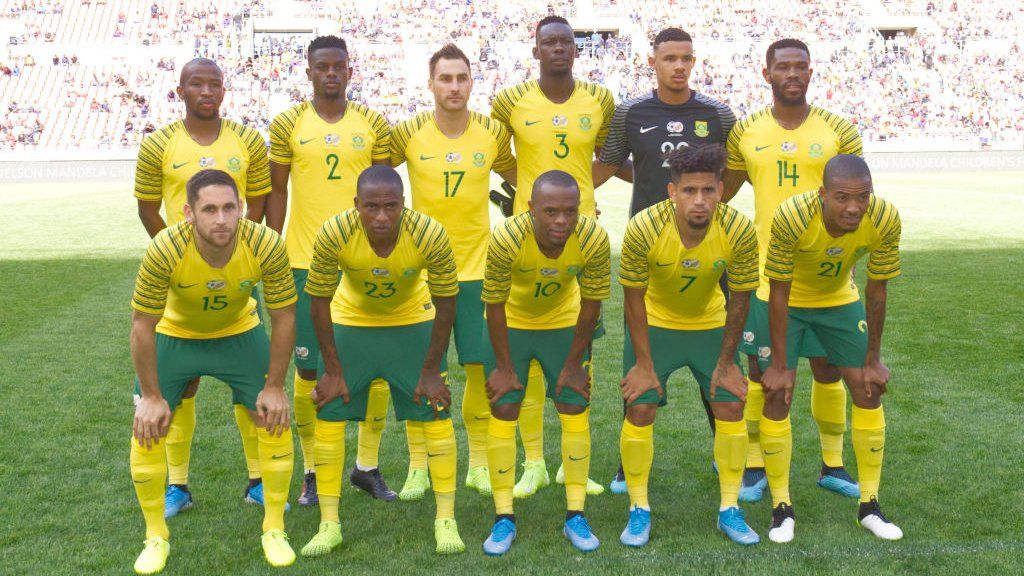
Gandhi's penchant for football didn't stop there. He, in fact, played a key role in establishing three clubs in Durban, Pretoria and Johannesburg. He in association with other social activists decided to use the same name for all three clubs, and that was Passive Resisters Soccer Club. Though there was no league at that time, these clubs played friendlies regularly to arrange funds for the family members of the activists who were detained for protesting against racial laws.
After his return to India in 1914, Passive Resisters Soccer Clubs became stagnant. However, South Africa's Indian origin people bore the responsibility of taking his task forward, with clubs like Moonlighters FC and Manning Rangers of Durban coming to being.
FIFA, in October 2010, paid a rich tribute to Gandhi in its 'HISTORIA' weekly section recognising his contributions to South African football that helped the nation become a multi-cultural 'Rainbow Nation'.
Back in India, Gandhi stayed away from football
In India, Gandhi decided to do away with football, considering the country's social and economic conditions.
He even discouraged youths from playing sports. In his autobiography “My Experiments With Truth”, Gandhi wrote, “To me, a sound body means one which bends itself to the spirit and is always a ready instrument at its service. Such bodies are not made, in my opinion, on the football field. They are made on cornfields and farms. I would urge you to think this over and you will find innumerable illustrations to prove my statement. Our colonial-born Indians are carried away with this football and cricket mania. These games may have their place under certain circumstances. But I feel sure that for us, who are just now so fallen, they have no room.”
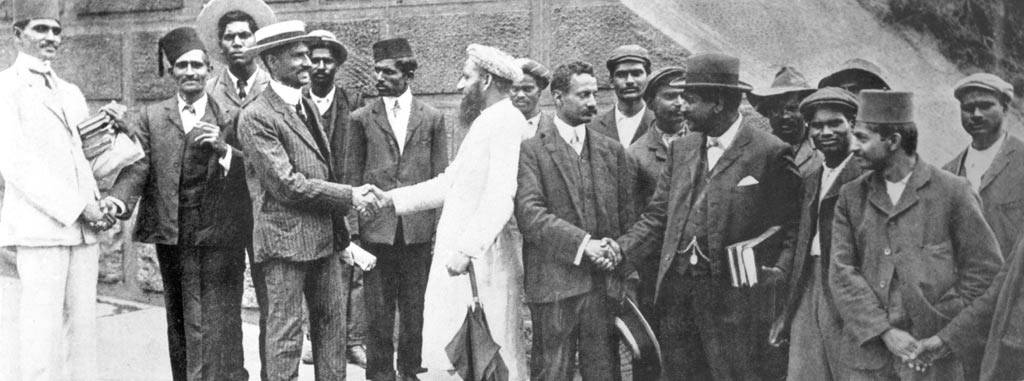
Gandhi, notwithstanding, felt that sports was a luxury for Indians who were ravaged by poverty and oppression. Such was his view of sports in India that he even vehemently opposed and ridiculed Indian princes playing sports alongside the British rulers. Though princes played sports to prove that they belonged to the same league as the English people did, Gandhi slammed them questioning their intellectual calibre. "In India, what do we observe as regards (to) the mental development of the princes who give their time to sports? Again, how many of those with well-developed intellectual powers are sportsmen? Experience shows that highly intellectual men are seldom sportsmen as well," he wrote.
"What is hockey?"
Prior to the 1932 Los Angeles Summer Olympics, Indian Hockey Federation (IHF) was in a dire need of money to fund the Indian team's participation in the Games. In 1928, when the Indian hockey team won its first Olympic gold, which also happened to be the country's first gold in the Olympic Games, IHF had to appeal to the Maharajas and businessmen to arrange money for India's campaign in the Amsterdam Games.
This time, IHF office-bearers thought that an appeal to the public from Mahatma Gandhi, the most influential man during the country's freedom struggle, would help them raise funds for the trip. So, with high hopes the IHF sent its representative, Charles Newman, to meet Gandhi, who was then in Shimla for an important talk with then Viceroy of India, Lord Irwin before the upcoming second Round Table Conference in London.
When the Gandhi-Irwin talk was over, Newman managed to tell Gandhi the reason for his visit. But to his surprise, Gandhi simply asked him, "What is hockey?" Doomed with Gandhi's expression, Newman returned Delhi empty-handed. The scene of Newman's meeting with Gandhi was well described in the book "GOAL - An Autobiography by Dhyan Chand".
So, it was evident that upon his return to India, his outlook towards sports had changed. He stopped considering sports as a device for social change as colonised India continued to struggle to free themselves from British rule.
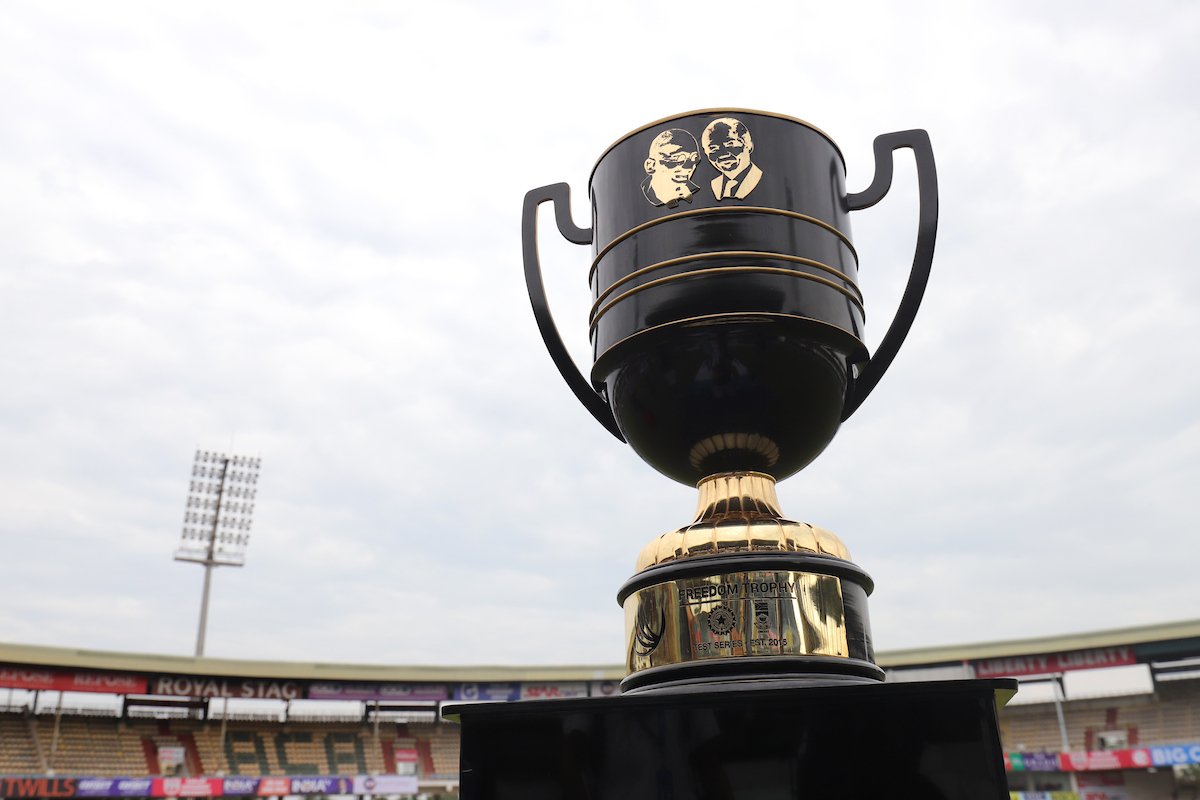
However, in his private life, Gandhi never discarded sports. He maintained his connection with South Africa's sports organisers and played a key role in helping the first-ever South African side to tour India, from November 1921 to March 1922. The team played 14 matches across the country, with Gandhi himself spending a considerable amount of time with them, during their visit to Ahmedabad.
Gandhi was also credited for the rise of cricket in India as he decided to stay away from Kolkata's football fever. He did it to stop youths from playing football. He thought football would divert the attention of the youths in Bengal, the birthplace of the Indian renaissance. But his decision proved fatal for football as the game continues to find itself in the shambles in modern-day India, and in time cricket triumphed in Mumbai. Gandhi also wrote about untouchability in cricket and campaigned strongly against it.
In 2015, BCCI, the patron of Indian cricket, honouring Mahatma Gandhi's contributions to sports named India-South Africa series after him and his South African equivalent Nelson Mandela as the Gandhi-Mandela Freedom Series.
-- By Sudipta Biswas
